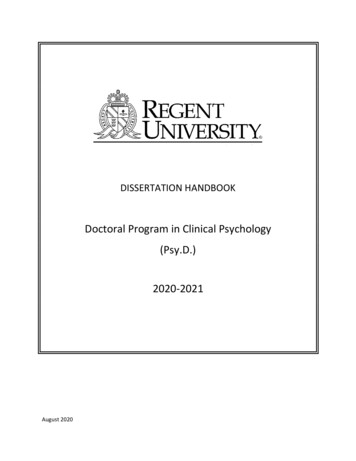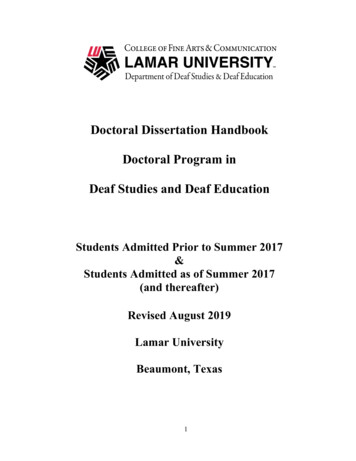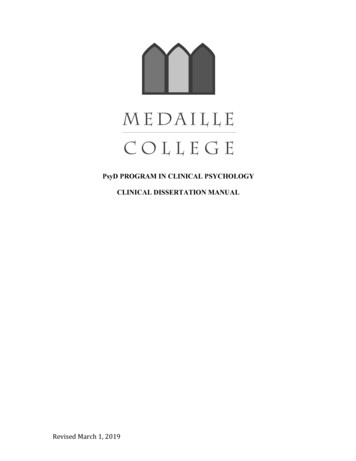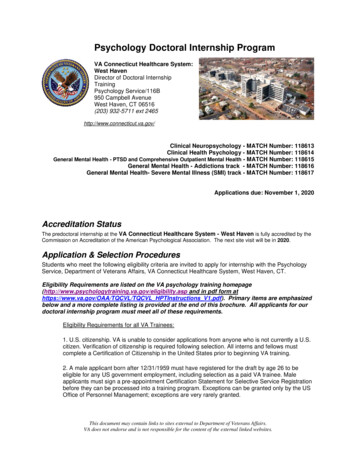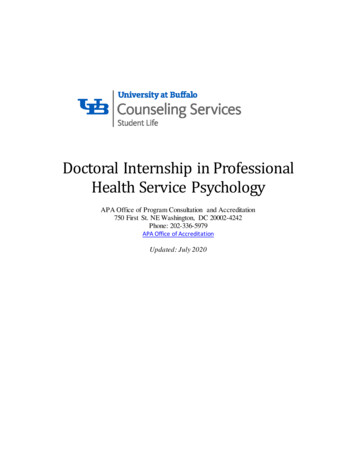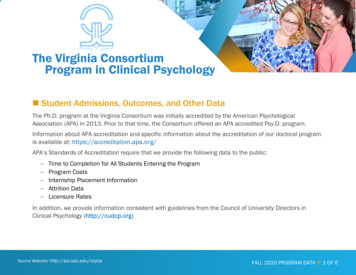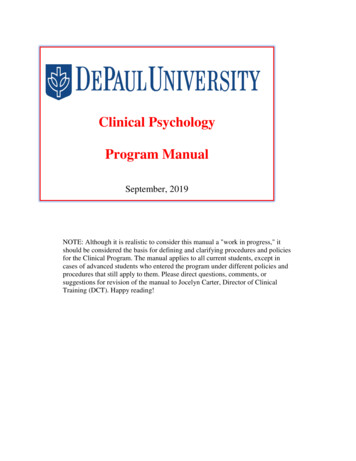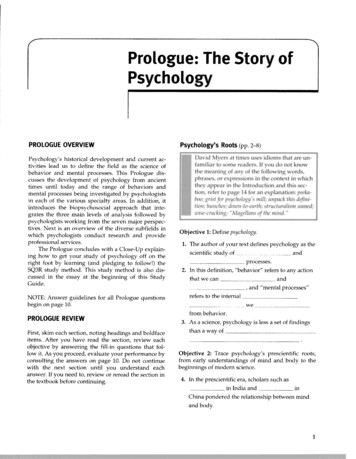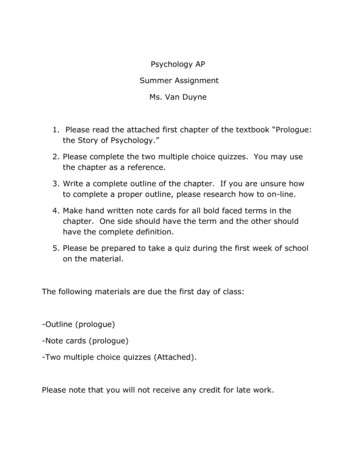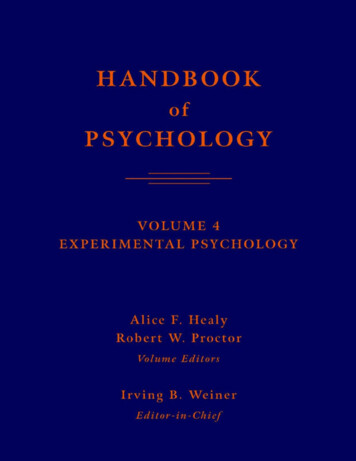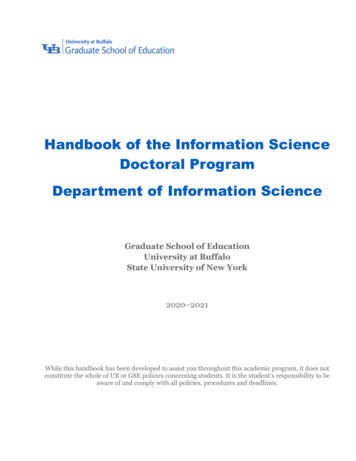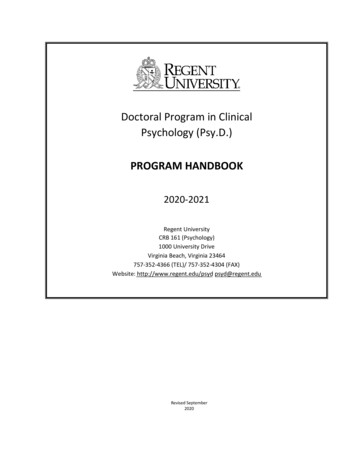
Transcription
Doctoral Program in ClinicalPsychology (Psy.D.)PROGRAM HANDBOOK2020-2021Regent UniversityCRB 161 (Psychology)1000 University DriveVirginia Beach, Virginia 23464757-352-4366 (TEL)/ 757-352-4304 (FAX)Website: http://www.regent.edu/psyd psyd@regent.eduRevised September2020
PROGRAM HANDBOOK POLICYThis handbook summarizes the policies in effect for the Doctoral Program in Clinical Psychology atthe start of the 2020-2021 academic year. All policies and requirements are subject to change.Students are expected to regularly review program announcements that accompany such changesand then to abide by the changed policies. Students from all cohorts are obligated to followcurrent program policy and procedures, as they evolve, unless otherwise stated.IMPORTANT NOTE: Handbooks are updated each year. Students mustadhere to the current academic year’s handbook for all programrequirements with the exception of requirements for programsprogression outlined in the University Catalog.SUMMARY OF CHANGES FROM THE 2019-20 PROGRAM HANDBOOKMultiple changes have been made throughout to improve clarity and update with currentinformation. Notable changes or additions include the following: Information regarding Graduate credit by transfer/Advanced Standing P. 32Course Fees P. 36Student Liability Insurance P. 38PsyD Faculty P. 3 & 54PsyD Program Leadership Council P.54 (Appendix A)
TABLE OF CONTENTSCONTENTSI. THE DOCTORAL PROGRAM IN CLINICAL PSYCHOLOGY1Program History, Training Philosophy and Mission1Practitioner-Scholar Training Model1Mission Statement of the Program2Program Logistics & Faculty3Faculty and Staff3II. PROGRAM PROCEDURES & POLICIES6Supportive Learning Environment6ACADEMIC ADVISING AND MENTORING7Approved Degree Program (ADP) and future cohorts Student Educational Plan (SEP).12Assistantships .14Attendance .14Colloquia/DPCP Special Events .14Course Evaluation .15Course Registration.16Criminal Background Check .19Grading .19Graduation & Degree Conferment .21Grievance Policy .23Inclement Weather Cancellations.24Integrity.24Library .24Masters Degree.25Performance Concerns .25Personal Therapy .26Professional Organizations .26Program Disenrollment & Leave of Absence .27Transferring to a Different Degree Program at Regent .30Research Teams .31Student Records/ Transcripts .31
Graduate Credit by Transfer/Advanced Standing .32Tuition & Fees . 35Writing Style .38III. DEGREE REQUIREMENTSClinical Training Requirements .38Competency Based Probes .38Coursework Completion .39Dissertation Completion .39Doctoral Candidacy Admission .40Library Course Completion .44Remedial Requirements.44Satisfactory Standing Maintenance .44V. PROGRAM OF STUDY45Curriculum .45Content Area Requirements .47Curriculum Changes. 48Integration .50VI. STUDENT LIFE51Career Services .51Chapel .51Communication.51Council of Graduate Students (COGS).52Social Activities & Town Meetings .52Student-Led Organizations .52Office Locations and Phone Numbers of Psy.D. Faculty, Staff& Cogs53APPENDIX A – PsyD Program Committees56APPENDIX B – PsyD Handbooks and Forms57A Note of Concern. 59Professional Development Form .61APPENDIX C – Resources for PsyD Students67Resources for Surviving and Thriving in the PsyD Program .67Mentoring .67Career Guidance .67APPENDIX D -- Key Steps in the PsyD Journey68
1I. THE DOCTORAL PROGRAM IN CLINICAL PSYCHOLOGYPROGRAM HISTORY, TRAINING PHILOSOPHY AND MISSIONThe Doctoral Program in Clinical Psychology (DPCP) is a practitioner-scholar program (PSY.D.) whichprepares scholar-clinicians with a Christian worldview to practice in an ethical and professionallycompetent manner. The initial training class of the DPCP entered in the fall of 1996. During that time,the Southern Association of Colleges and Schools (SACS) conducted a site visit to review the Doctor ofPsychology program and the program received “approved” status with a decision that no additionalreports were necessary. In addition, the DPCP program currently holds membership in the NationalCouncil of Schools and Programs of Professional Psychology (NCSPP). The DPCP is committed tocontinual refinement in order to provide students with state-of-the-art professional training. Studentsare encouraged to participate in the on-going program committees that shape the DPCP (See AppendixA). In assessing the quality of the program, a variety of training outcomes are being monitored. Theseoutcomes will also provide data relevant to professional accreditation. The DPCP has been designed tocomply with accreditation guidelines published by the American Psychological Association (APA). TheDPCP is accredited by the American Psychological Association Commission on Accreditation.American Psychological AssociationOffice of Program Consultation andAccreditation 750 First Street NEWashington, DC 20002-4242Telephone:202.336.5979 Email:apaaccred@apa.orgPRACTITIONER-SCHOLAR TRAINING MODELThe DPCP is designed to train students to practice in a highly professional manner that is informed bythe science of clinical psychology. Students are trained to apply analytic, problem-solving skills ofscientific thinking to their clinical practice. Although the faculty represents a variety of clinicalorientations, an emerging emphasis in empirically supported treatments is present throughout thecurriculum. This means that students are trained to utilize intervention techniques, which haveempirical support for their effectiveness.The DPCP culminates in the award of the Doctor of Psychology degree (Psy.D.). Consistent with the richand influential account of the Psy.D. training model advanced by the National Council of Schools andPrograms of Professional Psychology (NCSPP), the goal of the DPCP is to produce ‘local clinicalscientists.’ Trierweiler and Stricker (1998) explain that, according to the NCSPP vision, professionalpsychologists are
2 critical investigators of local (as opposed to universal) realities who are knowledgeableof research, scholarship, personal experience and scientific methodology. They also areable to develop plausible, communicable formulations for understanding essentially localphenomena using theory, general world knowledge including scientific research, and,most importantly, their own abilities as skeptical scientific observers (pg. 6).It is important for students to recognize that the adoption of a practitioner-scholar rather than ascientist- practitioner. training model at Regent does not mean a devaluing of the scientific identitycharacteristic of professional psychology. Instead, the goal is to develop those research, criticalthinking, conceptualization, problem-solving and other scientific skills that are particularly pertinent toclinical practice. DPCP graduates are to be ‘field scientists’ whose practice is grounded in scientificpsychology and whose approaches to practice reflect scientific attitudes.In contrast to pure practitioner programs, the Regent DPCP is committed to training local clinicalscientists who are “practitioner-scholars.” As an institution, Regent University is committed to trainingprofessionals who are prepared to develop as leaders in their professional contexts. Consequently, theDPCP is designed to produce students who are well equipped to emerge as leaders in health, mentalhealth and other practice settings. This is accomplished through a carefully planned sequence of coursework, clinical practica, and adjunctive training experiences. Students are also afforded otheropportunities, such as participation on faculty research teams and exposure to a range of preeminentscholars through the DPCP’s colloquium series. All of these program components are designed tocultivate a life-long commitment to ongoing learning and professional scholarship, which is particularlyrelevant to practice and professional service.While the Regent University DPCP is a program of professional psychology, it is also a program that iscommitted to the outworking of a Christian worldview. There are only a limited number of suchprograms in the United States. Regent’s DPCP is the only evangelical program east of Chicago. The DPCPis committed to an integration of faith and professional training that enhances and enriches bothtraditions without compromising or weakening either. The faculty utilizes a variety of integrationapproaches to accomplish the goal of training highly competent professional psychologists who operatefrom a Christian worldview.MISSION STATEMENT OF THE PROGRAMThe DPCP’s mission is encapsulated in the two statements below. The DPCP strives to:1. Educate doctoral students in a broad and general clinical practitioner scholar model, to obtain careersin health services psychology.2. Educate students in integration of psychology and Christian worldview
3PROGRAM LOGISTICS & FACULTYProgram Pace & LengthThe Regent University DPCP is a full-time five-year course of study. The first four years of the programconsists of course work, clinical training, and scholarship completed in residence at Regent. Studentswho enter the program with relevant graduate training may have a somewhat shortened course ofstudy (See ‘Transfer Credit”). The final year consists of a pre-doctoral internship. Although a limitednumber of pre- doctoral internships are available within a commutable distance from RegentUniversity, these experiences are highly competitive. Consequently, students should anticipaterelocation during the internship year. Full time study, for the purposes of the DPCP, is defined as thecompletion of 31 or more credits over a three-semester sequence within a calendar year orparticipation in an approved full-time internship. The DPCP can accommodate approximately 25 fulltime students in each class.FACULTY AND STAFFCore Faculty: The core faculty administers the DPCP, chair the dissertation committees, formulate thecurriculum, advise students, and conduct the annual evaluation process. All core faculty appointedcommit at least 50% of their time to the Psy.D. program for a period of at least 2 semesters peryear. Administrators have 100% appointments within the Psy.D. program.SPC DeanWilliam Hathaway, Ph.D., Bowling Green StateUniversity Post-Doctoral Fellowship: ClinicalChild Psychology, University of MassachusettsMedical Center Professor of PsychologyPsy.D. Program DirectorAnderson Rowan, Ph.D., ABPP, Fuller TheologicalSeminary Professor of PsychologyPsy.D. Clinical Training DirectorLinda Baum, Ph.D., Kent StateUniversity Associate Professorof Psychology
4Psychological Services CenterDirector Cassandra Page, Psy.D.,Biola UniversityAssociate Professor of PsychologyPsychological Services Center AssistantDirector Rachel Stephens, Psy.D., RegentUniversityAssistant Professor of PsychologyPracticum CoordinatorHannah Jones, Psy.D., Regent UniversityAssistant Professor of PsychologyAssistant Dean for the School of Psychology and Counseling (addresses issues of grievanceand student concerns for the SPC) and Integration CoordinatorFernando Garzon, Psy.D., Fuller TheologicalSeminary Professor of PsychologyOther FacultyJennifer Ripley, Ph.D., Virginia Commonwealth UniversityProfessor of Psychology, Rose Marie S. Hughes Endowed Co-ChairDenise Friedman, PhD, Virginia Polytechnic Institute and State UniversityAssociate ProfessorAssociate Faculty: Faculty in the School of Psychology and Counseling who serve in teaching or clinicaltraining roles in the PsyD program, but who serve in these roles less than 50% of their time and are notinvolved in program development or decision making.William Hathaway, Ph.D., Bowling Green StateJames Sells, Ph.D., University of SouthernCaliforniaC. Eric Jones, Ph.D., Florida AtlanticUniversityScott Sautter, PhDOlya Zaporozhets, Ph.D.
5Academic Services Manager/Administrative Staff serving the Psy.D. ProgramThe PsyD Program Academic Services Manager is Elizabeth Chute, M.A., M.A., Regent UniversityThe Psychological Services Center Administrative and Client Services Manager is Stacha AshburnThe Academic Services Manager and Assistant to the Dean of the School of PsychologyCounseling is Lynnette Harris, M.A., Regent UniversityandVarious Graduate Assistants work under the direction of the Psy.D. program Academic ServicesManager and Psychological Services Center Administrative and Client Services Manager.
6II. PROGRAM PROCEDURES &POLICIES SUPPORTIVE LEARNINGENVIRONMENTThe program seeks to establish a supportive learning environment. Faculty, staff and students allcontribute to the development of such an environment through treating each other with courtesy andrespect. Specifically, all interactions among students, faculty and staff should be collegial andconducted in a manner that reflects the highest standards of scholarly community and of the profession(see the current APA Ethical Principles of Psychologists and Code of Conduct). Additionally, faculty, staffand students each have specific actions unique to their role that will contribute to the development ofa support learning environment. Specifically:---Faculty support creation of this environment by being accessible to students, providingguidance and supervision, serving as appropriate role models and engaging in actions thatpromote student’s acquisition of knowledge, skills, and competencies consistent with theprogram’s training aims.Staff support creation of this environment by facilitating the availability of resources, educatingstudents on where policies and procedures can be found and guiding them to individuals whocan clarify policies or guide policy implementation, and providing feedback when needed.Students support this goal by being open and responsive to faculty and staff feedback, engagingwith faculty and staf
PsyD Faculty P. 3 & 54 PsyD Program Leadership Council P.54 (Appendix A) IMPORTANT NOTE: Handbooks are updated each year. Students must adhere to the current academic year’s handbook for all program requirements with the exception of requirements for programs progression outlined in the University Catalog.
